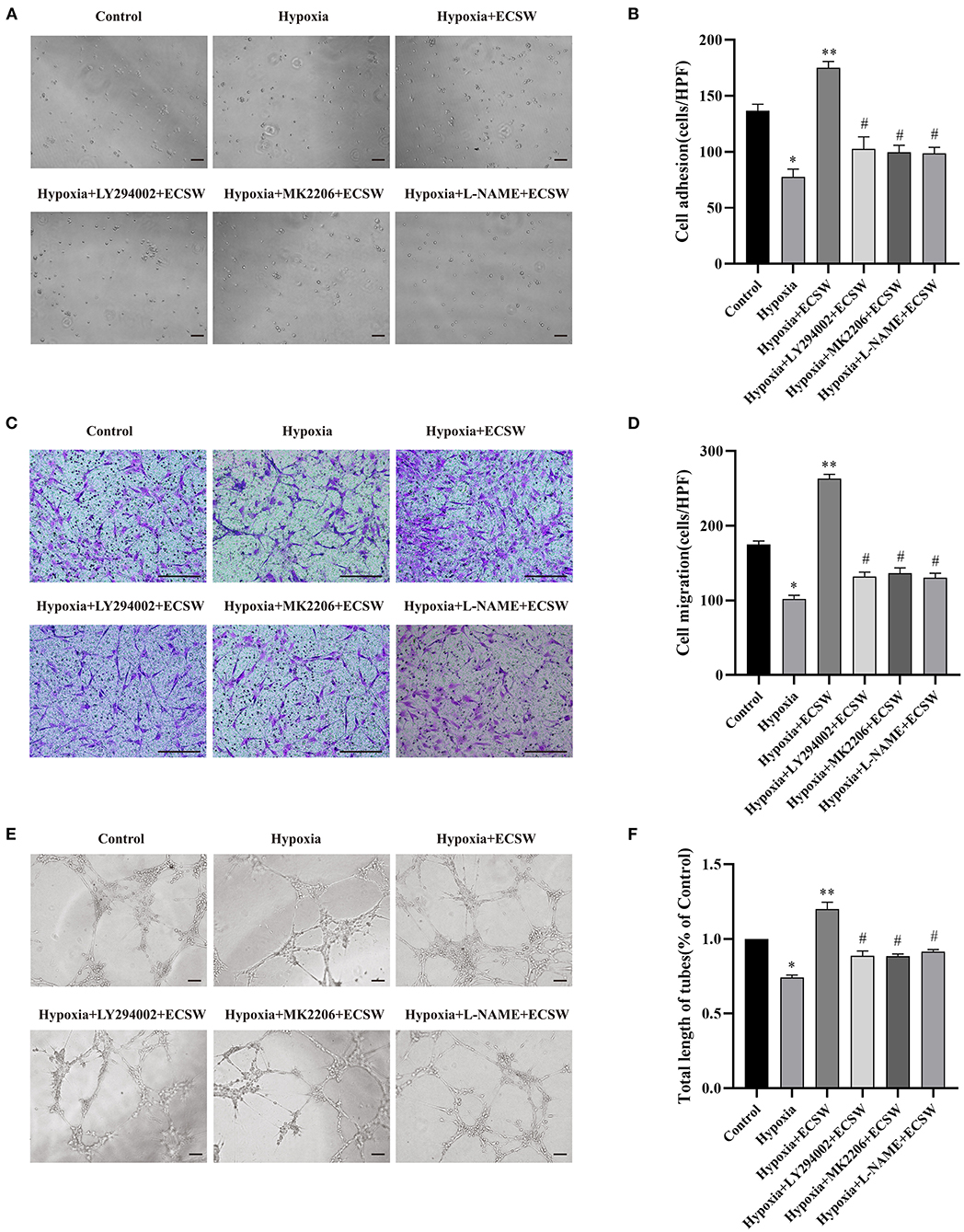Extracorporeal Cardiac Shock Waves Therapy Improves the Function of Endothelial Progenitor Cells After Hypoxia Injury via Activating PI3K/Akt/eNOS Signal Pathway
- 1Department of Cardiology, The First Affiliated Hospital of Kunming Medical University, Kunming, China
- 2Department of Cardiology, Yunnan Fuwai Cardiovascular Hospital, Kunming, China
- 3Department of Vascular Surgery, The First Affiliated Hospital of Kunming Medical University, Kunming, China
by Wang, M., Yang, D., Hu, Z., Shi, Y., Ma, Y., Cao, X., Guo, T., Cai, H., and Cai, H. (2021). Front. Cardiovasc. Med. 8:747497. doi: 10.3389/fcvm.2021.747497
In the original article, there was a mistake in Figure 4 as published. Because of our carelessness in combining images, we put the wrong images on Figures 4C and E. The corrected Figure 4 appears below.

Figure 4. ECSW improve the adhesive, migratory, and tube formation capacity of EPCs after hypoxic injury by activating PI3K/Akt/eNOS signaling pathway. (A,C,E) Representative images of EPCs adhesive, migratory, and tube formation in each group under a microscope. (A,E) Scale bar = 100 μm; (C) Scale bar = 200 μm. (B,D,F) Quantitative analysis of the adhesive, migratory, and tube formation of EPCs in each group. Data are presented as mean ± SD, N = 3. *P < 0.05 vs. group control, **P < 0.05 vs. group hypoxia, #P < 0.05 vs. group hypoxia + ECSW.
The authors apologize for this error and state that this does not change the scientific conclusions of the article in any way. The original article has been updated.
Publisher's Note
All claims expressed in this article are solely those of the authors and do not necessarily represent those of their affiliated organizations, or those of the publisher, the editors and the reviewers. Any product that may be evaluated in this article, or claim that may be made by its manufacturer, is not guaranteed or endorsed by the publisher.
Keywords: extracorporeal cardiac shock waves, endothelial progenitor cells, cell function, PI3K/Akt/eNOS signaling pathways, hypoxia injury, nitric oxide (NO)
Citation: Wang M, Yang D, Hu Z, Shi Y, Ma Y, Cao X, Guo T, Cai H and Cai H (2021) Corrigendum: Extracorporeal Cardiac Shock Waves Therapy Improves the Function of Endothelial Progenitor Cells After Hypoxia Injury via Activating PI3K/Akt/eNOS Signal Pathway. Front. Cardiovasc. Med. 8:793246. doi: 10.3389/fcvm.2021.793246
Received: 11 October 2021; Accepted: 08 December 2021;
Published: 22 December 2021.
Edited by:
Xiaofeng Yang, Temple University, United StatesReviewed by:
Zhao-Jun Liu, University of Miami, United StatesFeng Dong, Northeast Ohio Medical University, United States
Copyright © 2021 Wang, Yang, Hu, Shi, Ma, Cao, Guo, Cai and Cai. This is an open-access article distributed under the terms of the Creative Commons Attribution License (CC BY). The use, distribution or reproduction in other forums is permitted, provided the original author(s) and the copyright owner(s) are credited and that the original publication in this journal is cited, in accordance with accepted academic practice. No use, distribution or reproduction is permitted which does not comply with these terms.
*Correspondence: Hongbo Cai, aG9uZ2JvY2FpJiN4MDAwNDA7aG90bWFpbC5jb20=; Hongyan Cai, aHlmbHlrbSYjeDAwMDQwO3NpbmEuY29t
†These authors have contributed equally to this work and share first authorship
 Mingqiang Wang
Mingqiang Wang Dan Yang
Dan Yang Zhao Hu
Zhao Hu Yunke Shi
Yunke Shi Yiming Ma1
Yiming Ma1 Tao Guo
Tao Guo Hongbo Cai
Hongbo Cai Hongyan Cai
Hongyan Cai